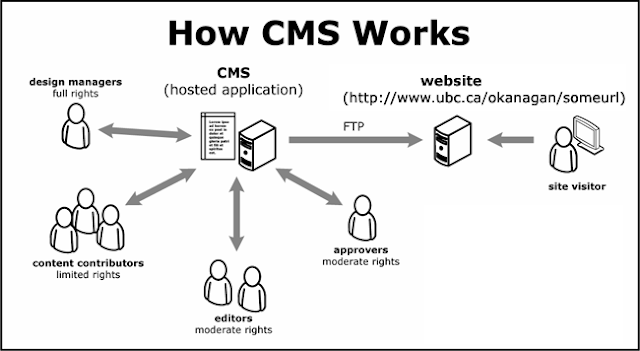 |
| How To CMS Work (ref image from UBC) |
In general, a CMS (Content Management System) consists of two elements: the content management application (Content Management Application, [CMA]) content delivery application (Content Delivery Application [CDA]). The CMA element allows the content manager may not have knowledge of HTML, to manage the creation, modification, and deletion of content from a Web site without the need to have expertise as a Webmaster. The CDA element uses and gather information that previously has been added, subtracted or changed by the web site owners to update or renew the Web site. Capabilities or features of a CMS system vary, even so, most of the software features a Web-based publishing, format management, revision control, the manufacturing index, search, and archiving.
Several kinds of benefits derived from the CMS system including the following:
1. Data Management to support HTML, XML, PDF, etc. because all processes run automatically.
2. Web Templates which can provide a reference to the entire contents of the site that has been set that can not be changed arbitrarily.
3. Separating between design and content that can be displayed in accordance with the wishes and needs of its users.
4. Supported data formats are varied from rss, rdf, xml until bekend scripting.
5. Portal (community site)
6. Forum
7. Photo gallery
8. E-Commerce
9. E-Learning, etc.
Several kinds of benefits derived from the CMS system including the following:
1. Data Management to support HTML, XML, PDF, etc. because all processes run automatically.
2. Web Templates which can provide a reference to the entire contents of the site that has been set that can not be changed arbitrarily.
3. Separating between design and content that can be displayed in accordance with the wishes and needs of its users.
4. Supported data formats are varied from rss, rdf, xml until bekend scripting.
5. Portal (community site)
6. Forum
7. Photo gallery
8. E-Commerce
9. E-Learning, etc.
CMS is divided into four main categories, namely: Enterprise Content Management System (ECMS), Web Content Management System (WCMS), Document Management System (DMS), and Mobile Content Management System.
Because CMS is a software, the CMS can be web-based or desktop applications outstanding. Currently the most widely CMS is a web-based CMS. Advantages of web-based CMS is able to update the site content from anywhere as long as the computer connected to the internet and the tool or tools that are used only a web browser. In addition, users can update the site content without having to fiddle with the layout or structure of the site.
Web-based CMS can be made with a variety of scripting for web programming languages such as ASP, PHP, JSP, or Java. The core of the CMS is to make changes or additions to the content of the site on the parts that are subject to change, for example, the latest news page, a product page or service, photo pages, and so forth. Data from CMS is stored in a database and searched or displayed quickly.
Because CMS is a software, the CMS can be web-based or desktop applications outstanding. Currently the most widely CMS is a web-based CMS. Advantages of web-based CMS is able to update the site content from anywhere as long as the computer connected to the internet and the tool or tools that are used only a web browser. In addition, users can update the site content without having to fiddle with the layout or structure of the site.
Web-based CMS can be made with a variety of scripting for web programming languages such as ASP, PHP, JSP, or Java. The core of the CMS is to make changes or additions to the content of the site on the parts that are subject to change, for example, the latest news page, a product page or service, photo pages, and so forth. Data from CMS is stored in a database and searched or displayed quickly.
CMS in Future
CMS concept is increasingly being used. Publication of an article to be faster because of its dynamic character. The more that is opensource CMS that makes it even more popular. The longer the CMS will be more consistent, professional and kind will be more and more specific as hypermedia, electronic document management, software engineering, marketing, and business process design.


Conversion Conversion Emoticon Emoticon